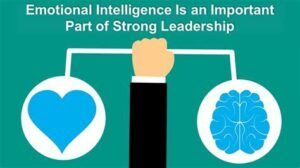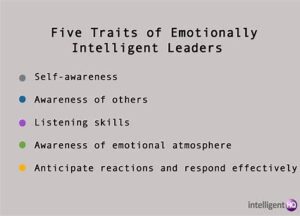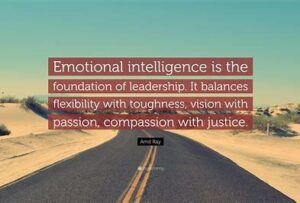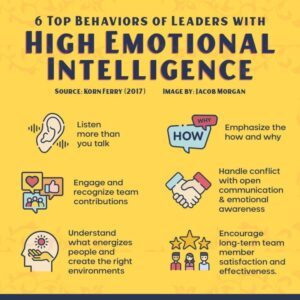Emotional intelligence (EI) is more than a buzzword—it’s about understanding and managing your emotions while recognizing and influencing the emotions of others. For leaders, EI holds the key to more effective leadership.

The five core components of emotional intelligence give a solid framework to work with: self-awareness, self-regulation, motivation, empathy, and social skills. Each plays a distinct role in enhancing leadership capabilities.
Self-awareness is where it all starts. It’s about knowing what you’re feeling and why. This awareness helps in making more informed decisions. Self-regulation comes next, where you’re controlling impulses and thinking before acting. This keeps stress in check and builds trust among your team.
Motivation within EI goes beyond external rewards and taps into intrinsic goals. Being driven by passion and purpose can be contagious for a team. Meanwhile, empathy opens up a window to understand the group’s mood and needs, creating deeper connections.
Lastly, social skills wrap it all up, focusing on building and maintaining healthy relationships. Effective communication, conflict management, and persuasion fall into this domain, critical for guiding teams toward a shared vision.
A strong grip on emotional intelligence rewrites how leaders interact with their teams, fostering an environment where everyone feels valued. It enhances overall organizational culture, leading to increased productivity and a more engaged workforce. Developing emotional intelligence isn’t just beneficial; it’s transformative.
click here to start your own online business for free Ced0224
Developing Self-Awareness as a Leader
Self-awareness forms the backbone of emotional intelligence, especially in leadership roles. It involves being in tune with your emotions, recognizing personal patterns, and understanding how your feelings affect others.

Mindfulness practices can help heighten self-awareness. Taking a few minutes each day to reflect or meditate allows leaders to stay grounded amidst the hustle of daily work. Reflective journaling is another useful tool—writing about daily experiences can shed light on emotional responses and behavioral patterns.
Soliciting feedback from colleagues and team members is crucial. It opens up perspectives you might not see on your own. Honest feedback can be eye-opening, highlighting strengths you might overlook and areas needing growth you might ignore.
Recognizing personal emotional triggers and biases is another essential step. Being aware of what ticks you off or makes you happy, and understanding why, helps in managing these emotions appropriately. This ensures reactions are measured rather than impulsive, fostering a more balanced leadership approach.
A solid self-awareness practice is crucial for effective decision-making and can be a preventative measure against burnout. Leaders aware of their limits are better at managing stress and maintaining well-being. This ripple effect does wonders for team morale and resilience.
Building Empathy and Social Skills
Empathy and social skills are pillars that support emotional intelligence within leadership. These elements enable leaders to connect with their teams on a deeper level, fostering trust and collaboration.

One practical technique for enhancing these skills is active listening. This means really hearing what team members are saying without interrupting or planning a response while they speak. It’s about giving someone your full attention. This practice helps in understanding the concerns and aspirations of others, making them feel valued.
Effective communication goes beyond just listening—it’s about expressing ideas clearly and empathetically, ensuring everyone involved feels understood. Being concise and open in communication builds stronger relationships within the team.
Empathy steps beyond understanding feelings; it’s about taking those insights and acting on them to improve team dynamics and solve conflicts constructively. It’s important to view situations from others’ perspectives, which can defuse potential tensions before they escalate.
Creating a collaborative environment is another key focus, where diversity is welcomed and differences are appreciated. Encouraging team members to share their thoughts and ideas without fear promotes an inclusive atmosphere. This leads to innovation and stronger team unity, driving productivity and morale forward.
Implementing Emotional Intelligence in Leadership Practices
Incorporating emotional intelligence into everyday leadership practices can dramatically shift how a team functions and performs. It involves more than just personal development—you must apply these skills across different aspects of leadership to create a thriving work environment.
One way to start is by weaving emotional intelligence into your leadership style. Consider how you approach meetings and interactions. Bringing in elements of self-awareness and empathy can change the dynamic of these engagements. Approach conversations with an open mind and empathy, ensuring you’re not just leading with authority but with understanding.

Fostering an emotionally intelligent culture within your organization takes conscious effort. It begins with setting an example as a leader. Show your team that values like empathy, patience, and understanding are important in every interaction. Encourage these values amongst your team members, too, by recognizing efforts to practice emotional intelligence.
Regular training and workshops focused on emotional intelligence can also serve as a valuable part of your leadership strategy. These sessions offer opportunities for teams to learn and practice emotional skills in a supportive setting. It equips your team to handle interpersonal challenges better, making them more resilient and adaptable.
Evaluating the impact of emotional intelligence on leadership success is critical for ongoing personal and team development. Regular feedback sessions can help monitor progress and adjust strategies as needed. It’s about creating an environment where everyone—not just the leadership—cultivates these essential skills for overall success.
